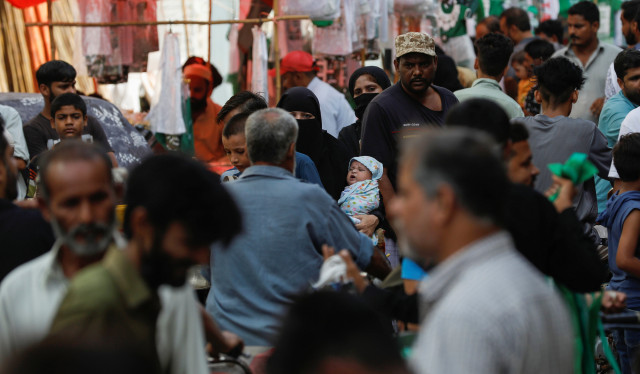Virus restrictions leave citizens baffled, sceptical
Health officials point to Karachiites nocturnal habits as cause for earlier closure of shops, restaurants

One doesn't have to think too far back to recall when nearly everyone in the city knew someone with the coronavirus. The deadly virus was making the rounds, hospitals were full, doctors were losing hope and the measures were strict. But then it got better. The government clamped down, the doctors hollered, and the public listened - and so, it seemed, we managed to get ahead of the pandemic.
Now, though, it appears we have grown complacent and the second wave of the pandemic is upon us. And with it, the authorities have once again turned to imposing stricter restrictions on citizens in the hope of warding off the contagion.
But with what appear to be quite contradictory regulations to many, citizens are baffled - and find themselves more sceptical and less inclined to take the measures seriously.
"Does the government think the virus is a bat?" laughed Karachi resident Shayan Ahmed, wondering why authorities were opting to shut shops, restaurants and wedding halls earlier at night, even though they were open all day.
S*, a shopkeeper at Tariq Road, posed the same question. "Why is everything so restricted after sunset? And why only in the city's posher areas?" he demanded, with others chiming in in agreement.
"I can see everyone shaking hands and hugging each other in most of the city. It's only in some places that citizens are asked to keep a distance or avoid meeting each other," pointed out A*, a university lecturer. "From what I know, the virus travels so quickly - so why are only a few areas treated like hotspots?"
For Ahmed, there is really just one answer to all these questions: "It must be some kind of politics," he said, nodding his head.
A parade of political gatherings in the city, one after the other, has only reinforced this impression as the Pakistan Democratic Movement, Pak Sarzameen Party and Sindh Awareness March - to name a few - turned up in the metropolis.
"The virus sleeps when there is a political procession here," remarked a shopkeeper near Pakistan Chowk. "Honestly, I don't think it's the virus that kills, but rather such policies," he opined. "The lockdown already disturbed everything. More restrictions will destroy us common people."
A question of habit
Regardless of whether the virus is nocturnal, health services director-general Dr Irshad Ahmed Memon is of the view that the time of the day is an important factor, given the habits of Karachi's residents.
"People here go out to shop in the evening. They go to restaurants and hotels for dinner with their families and friends. A lot of social interaction takes place after sunset," he explained.
With the new wave of the coronavirus surging, numbers have been going further and further up each day, but no one was taking it seriously, he added. "Through these restrictions, the government wants to discourage social gatherings. We had great success with the same strategy before," he told The Express Tribune, adding that health workers were at greater risk because the public was taking the virus too lightly.
Another senior health official warned that if the number of infections continued to rise, the government may opt for another lockdown. "We're all at risk and we must minimise it. The only way is to restrict people to their homes."
Meanwhile, other health department officials informed The Express Tribune that the impact of the recently imposed restrictions would be studied after two weeks, adding that the government was only trying its best to keep everyone safe.
Published in The Express Tribune, November 10th, 2020.



















COMMENTS
Comments are moderated and generally will be posted if they are on-topic and not abusive.
For more information, please see our Comments FAQ